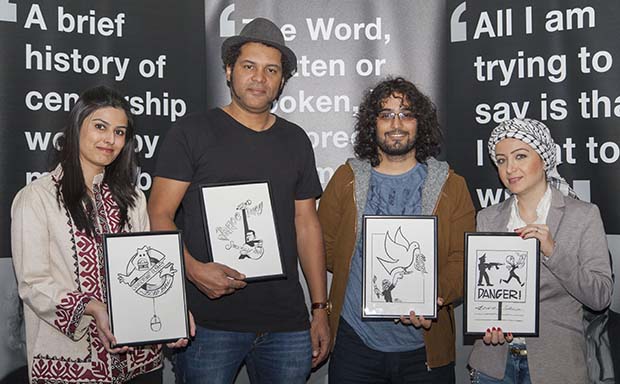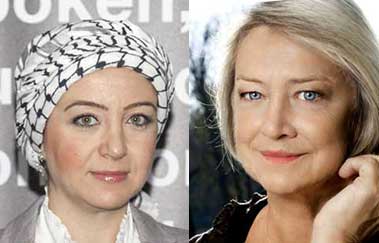Jodie Ginsberg: The question of hate speech
[vc_row][vc_column][vc_column_text]Ladies and gentlemen, Rafto laureates. It is my pleasure to be asked to speak to you today on the occasion of the 30th anniversary of the Rafto Foundation.
I represent Index on Censorship, an organisation that was born, much like Rafto, to help give voice and support to dissidents behind the Iron Curtain but whose mission, like Rafto’s, quickly spread much wider. Index is a freedom of expression organisation that campaigns against censorship globally and promotes the value of free expression.
Today I will talk about what I think is the hardest of all issues for free speech activists: the question of hate speech. And the question of whether it is possible to balance a belief in true freedom of expression for all with the recognition that, in many instances, hateful speech is used in such a way that can suppress the voices of minority and oppress groups.
What I want to offer today is a provocation. I want to argue that it is only by allowing free speech – that is allowing all forms of speech, including those espousing hateful views – that we can ultimately protect minority and oppressed groups. That the answer to hateful speech is not more bans or ever widening laws or definitions of hate, but finding mechanisms that better allow the speech of all groups to flow.
If the market for free ideas and the free exchange of ideas and opinions does not yet work perfectly, the answer is not to ban people from having a voice
I want to start by going back to basics and asking the question, why is free speech important? For me, and for Index, freedom of speech is the most important freedom because it is the freedom on which all others rest. If one cannot express freely one’s desires, one’s political or religious views, how can we be truly free? Without free speech, how can one speak out against the oppressor. Without free speech, the oppressed and marginalised are forced to suffer in silence.
John Stuart Mill wrote: “It is on the freedom of opinion and the freedom of expression of opinion, that the well-being of mankind depends” but I think Shahzad Ahmad, the 2014 winner of Index on Censorship Freedom of Expression Awards said it better: “Freedom of expression. To me this is the ultimate freedom: it means the freedom to live, to think, to love, to be loved, to be secure, to be happy.”
Freedom of speech is enshrined in the UN Declaration of Human Rights, the European Convention on Human Rights, the First Amendment. It became a sort of mantra in the wake of the killings last year at French satirical magazine Charlie Hebdo. You would think this was a freedom and a value on which we could all agree. And yet. And yet. The question of where we draw the line on free speech drives a wedge through our apparent agreement that free speech is a universal good with parameters on which we can all agree. And it is this ‘I am in favour of free speech BUT’ question that I want to address today.
Most commonly articulated in the aftermath of Charlie Hebdo was the position “I am in favour of free speech” but not when it is targeted against minorities. Definitions of what constituted a minority in these instances differed – from the religious groupings to ethnic grouping to socio-economic groupings. This sense that speech should not be used to punch down found its most powerful manifestation in the objection to many members of the American PEN center to Charlie Hebdo receiving a courage award in the months after the killings. This led still more – including a number of governments – to suggest that in order to deal with the effects of offensive speech, what was needed were more hate speech laws, not fewer. Those who objected to the works of groups like Charlie Hebdo argued that this would help protect minorities from words and images that they believe leads directly to more aggressive forms of discrimination, but also protect communities from the burgeoning non-violent, but nevertheless extremist messaging that many nations see as the source of violent extremism.
In practice, this sounds fairly reasonable. Cut out the hateful words, eliminate the violent behaviours, the discrimination, the racism, the homophobia. Except this is not how it works. And those who advocate and wish for additional hate speech laws, which – increasingly – seem to mark the advent of a return to blasphemy laws in many places where we thought they had been eliminated – should be careful what they wish for.
As the US delegation noted in a Human Rights Council meeting last year: “legal prohibitions on incitement are often used to persecute members of minority groups and political opponents, raising serious freedom of expression concerns.
“Such laws, including blasphemy laws, tend to reinforce divisions rather than promote societal harmony. The presence of these laws has little discernable effect on reducing actual incidences of hate speech. In some cases such laws actually serve to foment violence against members of minority groups accused of expressing unpopular viewpoints.
“In addition, legal prohibitions can displace societal efforts to combat intolerance. This occurs because disputes over hate speech are then seen as matters for courts to decide rather than society at large. Combating hate speech requires a change in the societal attitudes that give rise to discriminatory views. Prohibiting speech is a poor, if not counterproductive, means of achieving that goal.”
You need look no further than the discussions within the same Human Rights Council for evidence of the way in which hate speech laws are easily manipulated to target those with opposing view rather than protect minorities. During the debate, Russia praised hate speech laws, talking of the need to monitor “hate speech“ in Ukraine so as not to ignite “nationalistic fires.”
China – not celebrated for its tolerance of free speech – praised hate speech legislation, saying speech on the internet needed to promote the “norms of civilisation” and “harmony.”
It is easy to feel, particularly in the wake of Brexit in the UK and the rise of the so-called alt-right in the US, and the apparent rise in hateful, racist and misogynistic speech, that the best solution to support those affected such speech is to ban it. But I want to argue strongly that any acts that actively seek to limit the speech of one group, is ultimately detrimental for all. I want to argue against the current meme I see particularly in American discourse that says free speech is a construct for privileged white men to argue that free speech – genuine free speech that includes the ability to say things others find offensive, hateful and hurtful – is what protects all our rights to speak. If the market for free ideas and the free exchange of ideas and opinions does not yet work perfectly, the answer is not to ban people from having a voice, it is to work even harder – as everyone of you here does on a daily basis – to raise up the voices of those who are still not being heard, to demand the right to speak.[/vc_column_text][/vc_column][/vc_row][vc_row][vc_column][vc_basic_grid post_type=”post” max_items=”4″ element_width=”6″ grid_id=”vc_gid:1480340935409-d0a11d11-e407-8″ taxonomies=”6534″][/vc_column][/vc_row]



